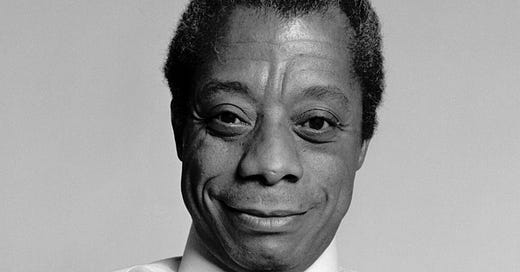James Baldwin on writing
The writer and civil rights activist would have been 100 years old today
Today is James Baldwin’s 100th birthday. Born James Arthur Jones in New York on 2 August 1924, he was the son of a single mother who had fled the discrimination and segregation in Maryland. He took his stepfather’s name, though they had a fraught relationship. He was a child during the Harlem Renaissance, during which the many intellectual and cultural dimensions of the African-American experience were recognized and celebrated.
During his teens and early twenties he met numerous people who befriended and influenced him, and would themselves have significant careers, such as the photographer Richard Avedon, the author Richard Wright, the painter Beauford Delaney, and the actor Marlon Brando. He began publishing essays in The New Leader and The Nation, and finally a short story saw print in 1948.
When he was 24, fed up with the bigotry throughout the United States, and coming to terms with his own homosexuality, he moved to Paris where he became a part of the Left Bank community of artists and writers. He published his first novel, Go Tell It on the Mountain, in 1953, and his first collection of essays, Notes of a Native Son, in 1955. He went on to publish a total of seven novels, six short stories, several plays, and scores of essays prior to his death in 1987, and be one of the most significant writers and cultural observers of the 20th century.
James Baldwin on writing (from various sources)
“You think your pain and your heartbreak are unprecedented in the history of the world, but then you read.”
“I read everything. I read my way out of the two libraries in Harlem by the time I was thirteen. One does learn a great deal about writing this way. First of all, you learn how little you know. It is true that the more one learns the less one knows. I’m still learning how to write. I don’t know what technique is. All I know is that you have to make the reader see it. This I learned from Dostoyevsky, from Balzac.”
“It was books that taught me that the things that tormented me most were the very things that connected me with all the people who were alive, or who had ever been alive.”
“Talent is insignificant. I know a lot of talented ruins. Beyond talent lie all the usual words: discipline, love, luck, but, most of all, endurance.”
“I don’t try to be prophetic, as I don’t sit down to write literature. It is simply this: a writer has to take all the risks of putting down what he sees. No one can tell him about that. No one can control that reality. It reminds me of something Pablo Picasso was supposed to have said to Gertrude Stein while he was painting her portrait. Gertrude said, ‘I don’t look like that.’ And Picasso replied, ‘You will.’ And he was right.”
“I still believe that the unexamined life is not worth living: and I know that self-delusion, in the service of no matter what small or lofty cause, is a price no writer can afford. His subject is himself and the world and it requires every ounce of stamina he can summon to attempt to look on himself and the world as they are.”
“The hardest thing in the world is simplicity. And the most fearful thing, too. You have to strip yourself of all your disguises, some of which you didn’t know you had. You want to write a sentence as clean as a bone. That is the goal.”
“I consider that I have many responsibilities, but none greater than this: to last, as Hemingway says, and get my work done.”
“You never get the book you wanted, you settle for the book you get. I’ve always felt that when a book ended there was something I didn’t see, and usually when I remark the discovery it’s too late to do anything about it.”
“Artists are here to disturb the peace.”
“You write in order to change the world ... if you alter, even by a millimeter, the way people look at reality, then you can change it.”
“One writes out of one thing only - one's own experience. Everything depends on how relentlessly one forces from this experience the last drop, sweet or bitter, it can possibly give.”
“A writer has to take all the risks of putting down what he sees. No one can tell him about that. No one can control that reality.”
“You cannot describe anything without betraying your point of view, your aspirations, your fears, your hopes. Everything.”
“Writing is a political instrument.”
“I certainly can’t imagine art for art’s sake . . . that’s a European approach, which never made any sense to me. I think what you have to do, which is the difficult thing about a writer, is avoid slogans. You have to have the [guts] to protest the slogan, no matter how noble it may sound. It always hides something else; the writer should try to expose what it hides.”
“When you’re writing, you’re trying to find out something which you don’t know. The whole language of writing for me is finding out what you don’t want to know, what you don’t want to find out. But something forces you to anyway.”
“Write. Find a way to keep alive and write. There is nothing else to say. If you are going to be a writer there is nothing I can say to stop you; if you’re not going to be a writer nothing I can say will help you. What you really need at the beginning is somebody to let you know that the effort is real.”






